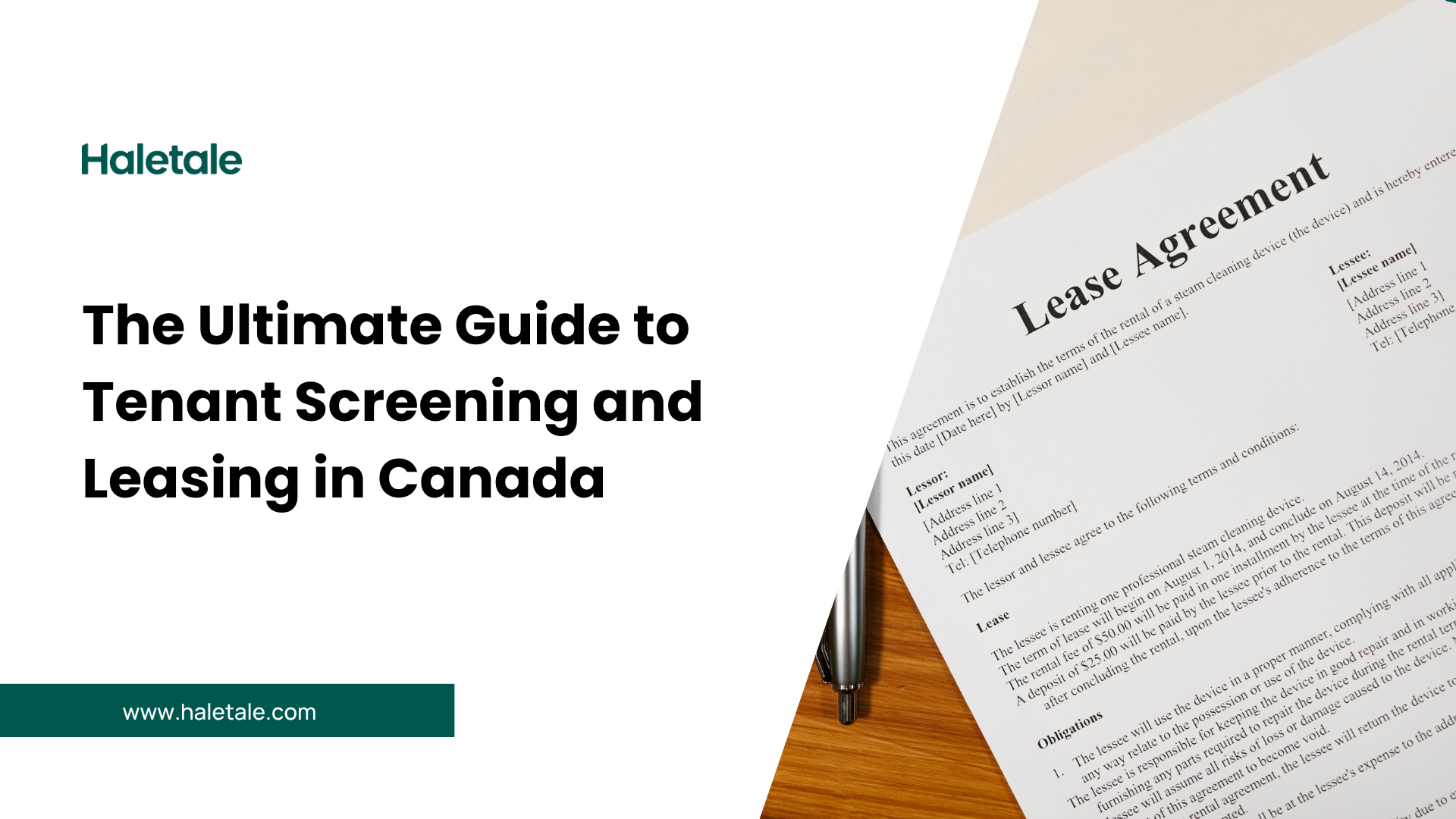Finding the Right Tenants: A Comprehensive Guide for Canadian Property Managers (2025 Edition)
Finding the right tenants is crucial for running a successful rental business, particularly in Canada, where tenant rights and regulations are detailed and province-specific. This comprehensive guide provides updated insights, best practices, and credible sources to help Canadian property managers effectively navigate tenant screening, lease agreements, tenant rights, and lease renewals.
Effective Tenant Screening Process
Tenant screening mitigates risks by verifying tenant reliability and financial stability.
Step-by-Step Tenant Screening
Set Clear Screening Criteria
Define clear tenant expectations such as income (typically 3x monthly rent), minimum credit scores (650+), and employment stability (1+ year). Communicate these criteria clearly in rental advertisements.
2025 Update: With new tenant screening regulations, landlords must ensure transparency in their screening criteria and avoid blanket policies that could be discriminatory.
Comprehensive Rental Application
Collect detailed personal information, rental and employment history, income verification, references, and explicit consent for background and credit checks. Under Canadian privacy laws (PIPEDA), written consent is mandatory before conducting any background checks.
Verify Income and Employment
Request recent pay stubs, bank statements, and employment letters confirming tenure, position, and salary.
Conducting Background and Credit Checks
Use authorized screening services such as Equifax, TransUnion, SingleKey, FrontLobby, or Certn. Evaluate credit scores, payment histories, debt-to-income ratios, and eviction records. Consider criminal records contextually and relevance to tenancy.
New Resource for 2025: Openroom.ca is a valuable crowdsourced platform where landlords and tenants can research past Landlord and Tenant Board (LTB) court orders. By searching a prospective tenant’s name or address, you can find publicly available tribunal decisions, eviction orders, and rental dispute history. With over 30,000 users monthly, Openroom helps landlords make informed decisions by revealing patterns such as non-payment of rent, property damage claims, or repeated evictions. The platform also allows you to report and track unpaid rental debt, which is reported to Equifax. This transparent resource protects both good landlords and good tenants by promoting accountability in the rental ecosystem.
Contact References
Reach out directly to previous landlords to confirm tenant reliability, rent payment punctuality, and property condition upon exit.
Real-Life Scenario
A landlord omitted comprehensive screening and faced rent arrears and property damage. One landlord noted, “I got stiffed for $25k in unpaid rent. I wish I had been able to research [using tools like Openroom] before this happened.” Proper screening could have flagged issues, preventing significant losses.
Crafting a Detailed Lease Agreement
A robust lease agreement protects both landlord and tenant by clearly outlining responsibilities and preventing misunderstandings.
Essential Lease Components
Tenant and Property Information
Clearly list all tenants and specify the rental unit address.
Lease Duration and Renewal Terms
Clearly define whether the lease is fixed-term (annual) or periodic (month-to-month).
Rent and Payment Details
Specify monthly rent amount, due dates, payment methods, and penalties for late payments.
2025 Rent Control Guidelines:
- Ontario: Maximum allowable increase is 2.5% for 2025 and 2.1% for 2026 (exemptions apply to units first occupied after November 15, 2018)
- British Columbia: 2.3% maximum for 2026
Security Deposits
Detail deposit amounts, terms of usage, holding conditions, and refund processes according to province-specific regulations. In Ontario, landlords can only collect last month’s rent (maximum one month). In BC, the maximum security deposit is half a month’s rent.
Maintenance Responsibilities
Clearly allocate maintenance and repair responsibilities between landlord and tenant.
Property Rules and Guidelines
Include guidelines around pets, smoking, noise, guests, and any specific property rules.
Lease Termination Conditions
Specify conditions for lease termination by either party, required notice periods, and move-out inspection procedures.
Quick Tip
In Ontario, using the provincial standardized lease form is mandatory for residential tenancies. Digital lease management through property management software ensures compliance with current regulations.
Understanding Canadian Tenant Rights
Canadian tenant laws offer substantial protections landlords must respect. Recent legislation in 2025 has strengthened tenant protections, particularly around rent control and evictions.
Key Tenant Rights
Right to a Safe, Habitable Home
Essential services like heat, water, and safety standards must be maintained. 2025 Toronto Update: As of April 30, 2025, Toronto’s Heating Bylaw requires a minimum temperature of 21°C from October 1 to May 15, with mandatory air conditioning operation from June 1 to September 30.
Privacy Rights
Landlords must generally provide at least 24-hour notice before entry, except in emergencies.
Protection from Retaliation
Tenants exercising their rights (e.g., reporting issues) cannot face eviction or punitive rent increases.
Fair Treatment and Anti-Discrimination
Landlords must treat tenants equitably without discrimination based on race, gender, marital status, religion, or other protected grounds under the Canadian Human Rights Act.
Rent Control Regulations
Provincial rent control regulations limit annual rent increases, protecting tenants from excessive hikes. Landlords must use proper notice forms and provide 90 days’ notice for any rent increase.
Protection from Illegal Evictions
2025 Anti-Renoviction Measures: New legislation in Ontario requires landlords to obtain permits for renovation evictions, provide detailed documentation, offer mandatory compensation, and give tenants the right of first refusal to return. Toronto now requires Rental Renovation Licences for major renovations that could displace tenants.
Real-Life Scenario
A tenant reports hazardous mold growth; landlords must address this promptly without retaliation to avoid legal repercussions. Disputes can be filed with provincial tribunals such as the Landlord and Tenant Board in Ontario or the Residential Tenancy Branch in BC.
Conducting Background and Credit Checks Effectively
Proper background and credit checks confirm tenant reliability while respecting privacy laws and regulations.
Key Steps:
- Obtain explicit written consent (required under PIPEDA)
- Use credible screening services compliant with privacy laws (Equifax, TransUnion, SingleKey, Certn, Tenant Verification Services)
- Search tribunal records on Openroom.ca to review any past evictions, non-payment orders, or rental disputes
- Carefully analyze financial stability, criminal history relevance, and eviction history
- Avoid blanket rejection policies; assess each applicant individually
2025 Screening Trends: Research shows that AI-powered screening tools and alternative credit data (such as utility payment history) are becoming increasingly important for comprehensive tenant evaluation.
Smooth Lease Renewals and Tenant Move-Outs
Properly managed lease renewals and move-outs retain quality tenants and protect property investments.
Lease Renewal Tips
- Initiate renewal discussions at least 60 days before lease expiration
- Clearly communicate about rent increases or lease changes (must comply with provincial guidelines)
- Provide timely written renewal agreements
- Use property management software to automate renewal reminders and streamline the process
Move-Out Management
- Clearly outline required notice periods (60 days in Ontario, varies by province)
- Conduct thorough inspections to document property conditions
- Promptly refund deposits minus documented damages (within 30-45 days as per provincial requirements)
- Maintain detailed records to prevent disputes
Real-Life Scenario
Proactive renewal discussions retain satisfied tenants, reducing costs and vacancy periods. Property managers using digital tenant portals report higher tenant satisfaction and retention rates.
Leveraging Property Management Tools like Haletale
Modern software such as Haletale simplifies screening and leasing processes while ensuring compliance with Canadian regulations.
Benefits of Haletale:
- Automated tenant screening with integrated credit checks
- Customizable, province-compliant lease templates that update with regulation changes
- Efficient centralized tenant communication through tenant portals
- Maintenance request tracking and management
- Financial reporting and accounting integrations (QuickBooks)
- White-label branding options for professional property management companies
- Mobile-friendly web- app for on-the-go management
According to industry comparisons, over 78% of successful Canadian property managers now use dedicated property management software, reporting significant time savings and improved tenant relationships.
Why Property Management Software Matters in 2025
With increasingly complex regulations and tenant expectations, property management platforms help landlords:
- Stay compliant with provincial laws
- Reduce administrative workload by 30%
- Collect rent 40% faster through automated systems
- Improve tenant satisfaction with 24/7 online portals
- Track maintenance issues efficiently
- Generate tax-ready financial reports
Learn more about Haletale’s features and how it compares to other property management solutions.
Integrating technology tools helps landlords streamline administrative tasks and focus on enhancing tenant relationships. Learn more about our tenant portal here.
Additional Resources for Canadian Landlords
Provincial Tenancy Boards
- Ontario: Landlord and Tenant Board
- British Columbia: Residential Tenancy Branch
- Alberta: Residential Tenancy Dispute Resolution Service
Tenant & Landlord Research Tools
- Openroom.ca – Search tribunal court orders, track rental debt, and research tenant/landlord history
- Openroom University – Free educational videos on running a compliant rental business
- Openroom Resources – Ultimate guides about tenancy disputes
Screening Services
- SingleKey – Tenant screening and credit checks
- Certn – Comprehensive background screening
- Tenant Verification Services – Credit and criminal checks
Industry Information
- Canadian Federation of Apartment Associations
- Property Management Industry Trends
- Best Practices for Managing Rental Properties
Conclusion
Implementing thorough tenant screening methods, detailed leases, understanding tenant rights, and leveraging advanced property management tools like Haletale significantly enhance rental operations, ensuring compliance, minimizing disputes, and building sustainable rental portfolios.
Key Takeaways for 2025:
- Use comprehensive screening including credit checks, references, and tribunal record searches on Openroom.ca
- Stay updated on provincial rent control guidelines and tenant protection laws
- Implement digital lease management with province-specific compliant forms
- Leverage property management software to automate processes and improve efficiency
- Maintain clear communication and documentation throughout the tenancy
- Research both tenants and landlords using available tools to promote accountability
By combining traditional screening methods with modern technology platforms and transparency tools like Openroom, Canadian landlords can make informed decisions, protect their investments, and foster positive landlord-tenant relationships.
Ready to streamline your property management? Discover how Haletale can transform your rental business with automated screening, compliant lease management, and centralized operations—all designed specifically for Canadian property managers.
Last Updated: September 2025









